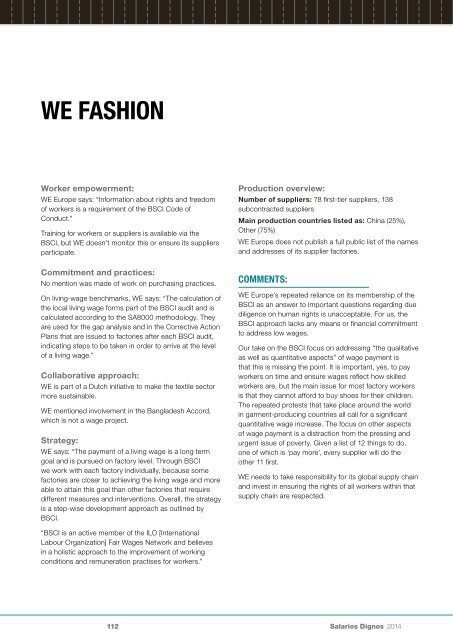17Investigación SALARIOS dignos definitiva
17Investigación SALARIOS dignos definitiva
17Investigación SALARIOS dignos definitiva
You also want an ePaper? Increase the reach of your titles
YUMPU automatically turns print PDFs into web optimized ePapers that Google loves.
WE FASHION<br />
Worker empowerment:<br />
WE Europe says: “Information about rights and freedom<br />
of workers is a requirement of the BSCI Code of<br />
Conduct.”<br />
Training for workers or suppliers is available via the<br />
BSCI, but WE doesn’t monitor this or ensure its suppliers<br />
participate.<br />
Commitment and practices:<br />
No mention was made of work on purchasing practices.<br />
On living-wage benchmarks, WE says: “The calculation of<br />
the local living wage forms part of the BSCI audit and is<br />
calculated according to the SA8000 methodology. They<br />
are used for the gap analysis and in the Corrective Action<br />
Plans that are issued to factories after each BSCI audit,<br />
indicating steps to be taken in order to arrive at the level<br />
of a living wage.”<br />
Collaborative approach:<br />
WE is part of a Dutch initiative to make the textile sector<br />
more sustainable.<br />
WE mentioned involvement in the Bangladesh Accord,<br />
which is not a wage project.<br />
Strategy:<br />
WE says: “The payment of a living wage is a long term<br />
goal and is pursued on factory level. Through BSCI<br />
we work with each factory individually, because some<br />
factories are closer to achieving the living wage and more<br />
able to attain this goal than other factories that require<br />
different measures and interventions. Overall, the strategy<br />
is a step-wise development approach as outlined by<br />
BSCI.<br />
Production overview:<br />
Number of suppliers: 78 first-tier suppliers, 138<br />
subcontracted suppliers<br />
Main production countries listed as: China (25%),<br />
Other (75%)<br />
WE Europe does not publish a full public list of the names<br />
and addresses of its supplier factories.<br />
COMMENTS:<br />
WE Europe’s repeated reliance on its membership of the<br />
BSCI as an answer to important questions regarding due<br />
diligence on human rights is unacceptable. For us, the<br />
BSCI approach lacks any means or financial commitment<br />
to address low wages.<br />
Our take on the BSCI focus on addressing “the qualitative<br />
as well as quantitative aspects” of wage payment is<br />
that this is missing the point. It is important, yes, to pay<br />
workers on time and ensure wages reflect how skilled<br />
workers are, but the main issue for most factory workers<br />
is that they cannot afford to buy shoes for their children.<br />
The repeated protests that take place around the world<br />
in garment-producing countries all call for a significant<br />
quantitative wage increase. The focus on other aspects<br />
of wage payment is a distraction from the pressing and<br />
urgent issue of poverty. Given a list of 12 things to do,<br />
one of which is ‘pay more’, every supplier will do the<br />
other 11 first.<br />
WE needs to take responsibility for its global supply chain<br />
and invest in ensuring the rights of all workers within that<br />
supply chain are respected.<br />
“BSCI is an active member of the ILO [International<br />
Labour Organization] Fair Wages Network and believes<br />
in a holistic approach to the improvement of working<br />
conditions and remuneration practises for workers.”<br />
112<br />
Salarios Dignos 2014


